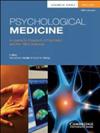Neural responses to facial emotions and subsequent clinical outcomes in difficult-to-treat depression.
IF 5.9
2区 医学
Q1 PSYCHIATRY
引用次数: 0
Abstract
BACKGROUND Amygdala and dorsal anterior cingulate cortex responses to facial emotions have shown promise in predicting treatment response in medication-free major depressive disorder (MDD). Here, we examined their role in the pathophysiology of clinical outcomes in more chronic, difficult-to-treat forms of MDD. METHODS Forty-five people with current MDD who had not responded to ⩾2 serotonergic antidepressants (n = 42, meeting pre-defined fMRI minimum quality thresholds) were enrolled and followed up over four months of standard primary care. Prior to medication review, subliminal facial emotion fMRI was used to extract blood-oxygen level-dependent effects for sad v. happy faces from two pre-registered a priori defined regions: bilateral amygdala and dorsal/pregenual anterior cingulate cortex. Clinical outcome was the percentage change on the self-reported Quick Inventory of Depressive Symptomatology (16-item). RESULTS We corroborated our pre-registered hypothesis (NCT04342299) that lower bilateral amygdala activation for sad v. happy faces predicted favorable clinical outcomes (rs[38] = 0.40, p = 0.01). In contrast, there was no effect for dorsal/pregenual anterior cingulate cortex activation (rs[38] = 0.18, p = 0.29), nor when using voxel-based whole-brain analyses (voxel-based Family-Wise Error-corrected p < 0.05). Predictive effects were mainly driven by the right amygdala whose response to happy faces was reduced in patients with higher anxiety levels. CONCLUSIONS We confirmed the prediction that a lower amygdala response to negative v. positive facial expressions might be an adaptive neural signature, which predicts subsequent symptom improvement also in difficult-to-treat MDD. Anxiety reduced adaptive amygdala responses.难以治疗的抑郁症患者对面部情绪的神经反应及其后续临床结果。
背景杏仁核和背侧前扣带回皮层对面部情绪的反应有望预测无药物治疗的重度抑郁障碍(MDD)患者的治疗反应。方法45名对⩾2种血清素能抗抑郁药无反应的重度抑郁症患者(n = 42,符合预定义的fMRI最低质量阈值)被纳入研究,并在4个月的标准初级保健期间接受随访。在进行药物复查之前,使用潜意识面部情绪 fMRI 从两个预先注册的先验定义区域(双侧杏仁核和背侧/前扣带回皮层)提取血氧水平对悲伤与快乐面部的依赖性效应。结果我们证实了预先注册的假设 (NCT04342299),即双侧杏仁核对悲伤与快乐面孔较低的激活预示着有利的临床结果 (rs[38] = 0.40, p = 0.01)。相比之下,背侧/前额扣带回皮层激活没有影响(rs[38] = 0.18,p = 0.29),使用基于象素的全脑分析也没有影响(基于象素的家族-明智误差校正 p <0.05)。我们证实了这样的预测,即杏仁核对负面与正面面部表情的反应较低可能是一种适应性神经特征,它可以预测难以治疗的 MDD 患者随后的症状改善情况。焦虑降低了杏仁核的适应性反应。
本文章由计算机程序翻译,如有差异,请以英文原文为准。
求助全文
约1分钟内获得全文
求助全文
来源期刊

Psychological Medicine
医学-精神病学
CiteScore
11.30
自引率
4.30%
发文量
711
审稿时长
3-6 weeks
期刊介绍:
Now in its fifth decade of publication, Psychological Medicine is a leading international journal in the fields of psychiatry, related aspects of psychology and basic sciences. From 2014, there are 16 issues a year, each featuring original articles reporting key research being undertaken worldwide, together with shorter editorials by distinguished scholars and an important book review section. The journal''s success is clearly demonstrated by a consistently high impact factor.
 求助内容:
求助内容: 应助结果提醒方式:
应助结果提醒方式:


